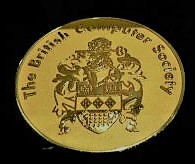BCS Lovelace Medal
| BCS Lovelace Medal | |
|---|---|
 | |
| Description | "Individuals who have made an outstanding contribution to the understanding or advancement of Computing." |
| Country | |
| Presented by | British Computer Society |
| First awarded | 1998 |
| Website | Official website |
The Lovelace Medal was established by the British Computer Society in 1998, and is presented to individuals who have made outstanding contributions to the understanding or advancement of computing.[1] It is the top award in computing in the UK.
The award is named after Ada Lovelace, who was the daughter of Lord Byron and an English mathematician, scientist, and writer. She worked with computer pioneer Charles Babbage on the proposed mechanical general-purpose computer – The Analytical Engine,[2] in 1842 and is often described as the world's first female computer programmer.[3]
The medal is intended to be presented to individuals, without regard to their countries of domicile. It is generally anticipated that there will be one medalist each year, but the regulation does not preclude either several medalists or no medalist.
Medal recipients
Awardees include:[4]
- 2019 Marta Kwiatkowska - probabilistic model checking for the data-rich world
- 2018 Gordon Plotkin[5] – for contributions to semantic framework for programming languages
- 2017 Georg Gottlob – for contributions to the logical and theoretical foundations of databases
- 2016 Andrew Blake[6] – for contributions to the understanding and advancement of computing as a discipline
- 2015 Ross Anderson[7] – for contributions to building security engineering into a discipline
- 2014 Steve Furber[8] – for designing the ARM microprocessor architecture and contributions to computer systems
- 2013 Samson Abramsky – for contributions to domain theory, game semantics and categorical quantum mechanics
- 2012 Grady Booch – for contributions to software architecture, software engineering and collaborative environments
- 2011 Hermann Hauser – for entrepreneurship and for co-developing the BBC Micro Computer
- 2010 John C. Reynolds – for contributions to logical foundations of programs and programming languages
- 2009 Yorick Wilks – for contributions to meaning-based understanding of natural language
- 2008 Tony Storey – for contributions to Autonomic Computing
- 2007 Karen Spärck Jones – for contributions to natural language processing
- 2006 Sir Tim Berners-Lee – for inventing the World Wide Web
- 2005 Nick McKeown – for contributions to router hardware design
- 2004 John Warnock of Adobe Systems – for contributions in document processing
- 2002 Ian Foster and Carl Kesselman – for contributions to grid computing
- 2001 Douglas C. Engelbart – for inventing the computer mouse
- 2000 Linus Torvalds – for creating the Linux kernel operating system
- 1998 Michael A. Jackson and Chris Burton – for program design and structured programming
See also
References
- ^ "About the Lovelace Medal".
- ^ "Lovelace Medal and Lecture".
- ^ J. Fuegi and J. Francis, "Lovelace & Babbage and the creation of the 1843 'notes'." Annals of the History of Computing 25 #4 (Oct–Dec 2003): 16–26. Digital Object Identifier
- ^ British Computer Society
- ^ https://www.ed.ac.uk/informatics/news-events/stories/2018/gordon-plotkin-awarded-ada-lovelace-medal
- ^ "Professor Andrew Blake named as BCS Lovelace Medal Winner 2016".
- ^ "Professor Ross Anderson named as BCS Lovelace Medal Winner 2015".
- ^ "Manchester's Steve Furber receives BCS Lovelace Medal, becomes Distinguished Fellow". Electronics Weekly.
